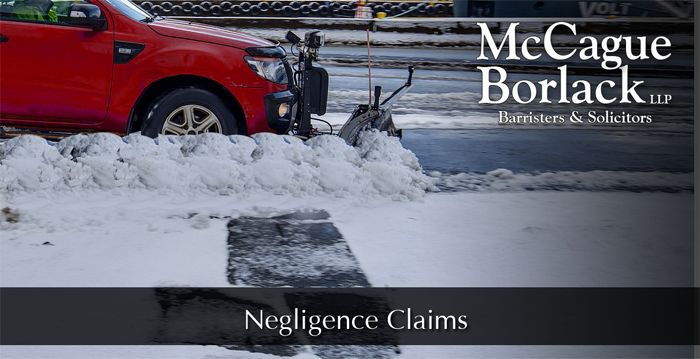By Alan Drimer
When is the government entitled to act without the possibility of liability or subsequent second-guessing by the Courts? It is generally accepted that policy decisions made by government actors are immune from findings of liability claimed in negligence.
However, the Supreme Court of Canada in Nelson (City of) v. Marchi, 2021 SCC 41, has provided additional guidance on this topic. More specifically “core policy decisions” by governments will not attract liability, because the legislative branches have “core institutional roles and competencies that must be protected from interference from the judiciary’s private law oversight”. However, “operational” decisions made by governments, which deal with the implementation of such policies are not immune to actions grounded in negligence.
In this case, the plaintiff, Ms. Marchi suffered personal injuries as a result of a slip and fall following a snowfall in Nelson, British Columbia. The City of Nelson had a policy by removing snow that resulted in the creation of continuous windrows, which are piles of snow left at the bottom of a driveway, sidewalk, or entrance. However, the City of Nelson created continuous windrows along the sidewalk, such that the plaintiff, when she exited her vehicle along the street, had to step over the windrow in order to access the sidewalk. The plaintiff sued the City of Nelson for negligence in leaving windrows along the road, leaving little space for pedestrians to cross from the roadway to the sidewalk safely.
At trial, the action was dismissed following a finding by the British Columbia Supreme Court that the snow plowing undertakings were bona fide policy decisions. As such, it was ruled that the snowplowing decisions were “core policy decisions”, and therefore immune from liability.
On appeal, the British Columbia Court of Appeal ruled that the trial judge failed to distinguish between core policy and operational decisions. As such, the action was remitted back to the British Columbia Supreme Court for a new trial.
...four factors to dermine if a decision is core policy or operational... |
The City of Nelson appealed to the Supreme Court of Canada. The Supreme Court of Canada found the snow plowing policies were not a core policy decision immune from negligence, and that the City of Nelson owed the plaintiff a duty of care. In contrast, the snow plowing policies were an operation policy, and therefore subject to the court’s analysis.
The Supreme Court of Canada enumerated four factors in making the determination as to whether a decision is a core policy decision or an operational decision:
- The level and responsibilities of the decision-maker
The closer an actor or decision-maker is to an elected official, the more likely it is a core policy decision. Core policy decisions are generally made by persons with a high level of authority. Decisions far-removed from a democratically accountable official are less likely to attract core policy immunity.
- The process by which the decision was made
Decisions made that are (i) subject to deliberation, (ii) have broad applications, and (iii) are prospective in nature, represent the hallmarks of core policy decision. This is in opposition to decisions that are left to the discretion, judgement, or reaction of individual employees.
- The nature and extent of budgetary considerations
Most, if not all decisions will require some level of budgetary consideration, however, where a budgetary concern is broad, they are more likely to fall within the core competencies of the legislative and executive branches.
- The extent to which the decision was based on objective criteria
Where there is balancing between a variety of competing considerations, these decisions are more likely to engage immunity because, without this, the court would be substituting their own judgement over that of a democratically elected government.
In summary, the Supreme Court of Canada was unwilling to provide government decision-makers with a catch-all immunity against negligence claims. This decision provides clarity between the difficult distinction between a core and an operational policy decision. Although this case was grounded in snow plowing policies, one can consider a number of decisions that are made by municipalities such as preventions of rocks or trees falling onto the road, or black ice covering a highway.
Now, when an action in negligence is brought against a governmental decision-maker, both parties will have four enumerated factors to consider as to whether the decision will be immune from liability if it can be framed as a core policy decision. Notwithstanding, this issue likely will be hotly litigated in the coming years.


